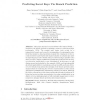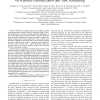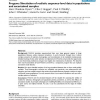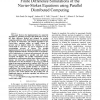874 search results - page 33 / 175 » Predicting the Running Times of Parallel Programs by Simulat... |
106
click to vote
CTRSA
2007
Springer
15 years 7 months ago
2007
Springer
This paper announces a new software side-channel attack — enabled by the branch prediction capability common to all modern highperformance CPUs. The penalty paid (extra clock cyc...
120
click to vote
ISPASS
2009
IEEE
2009
IEEE
Machine learning based online performance prediction for runtime parallelization and task scheduling
15 years 8 months ago
—With the emerging many-core paradigm, parallel programming must extend beyond its traditional realm of scientific applications. Converting existing sequential applications as w...
120
click to vote
APLAS
2010
ACM
14 years 11 months ago
2010
ACM
Live heap space analyses have so far been concerned with the standard sequential programming model. However, that model is not very well suited for embedded real-time systems, wher...
BMCBI
2008
15 years 1 months ago
2008
Background: FREGENE simulates sequence-level data over large genomic regions in large populations. Because, unlike coalescent simulators, it works forwards through time, it allows...
146
click to vote
SBACPAD
2003
IEEE
15 years 6 months ago
2003
IEEE
This paper discusses the implementation of a numerical algorithm for simulating incompressible fluid flows based on the finite difference method and designed for parallel compu...




